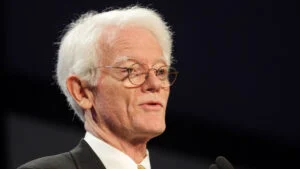Peter Lynch and the Fidelity Magellan Fund: A Legacy of Outperformance
Peter Lynch is one of the most well-known and successful mutual fund managers in history. His time at the helm of the Fidelity Magellan Fund from 1977 to 1990 left an indelible mark on the mutual fund industry. Under Lynch’s leadership, the Fidelity Magellan Fund not only achieved extraordinary returns but also became a symbol of successful active management. Lynch’s strategy of blending thorough research, long-term investment, and a keen understanding of market trends turned him into a legendary figure in finance.
The Rise of Peter Lynch
Peter Lynch was born in 1944 in Newton, Massachusetts. After earning a degree in finance from Boston College and an MBA from the University of Pennsylvania’s Wharton School of Business, Lynch began his career in investment management. He joined Fidelity Investments in 1966 and, by 1977, took over as the manager of the Fidelity Magellan Fund, a position that would propel him to fame.
At the time Lynch took over, the fund had around $18 million in assets. The Magellan Fund was a relatively small player in the vast world of mutual funds. However, under Lynch’s guidance, the fund would eventually grow into one of the largest and most successful mutual funds in the world. By the time he retired in 1990, the fund had amassed more than $14 billion in assets, and its annualized return of 29.2% during Lynch’s tenure vastly outpaced the S&P 500 index.
The Fidelity Magellan Fund’s Success
The Fidelity Magellan Fund is particularly famous for its remarkable performance during Peter Lynch’s time managing it. Over the 13-year period between 1977 and 1990, the fund delivered returns that far exceeded the broader stock market, which made it one of the best-performing mutual funds in history.
To put this into perspective, the S&P 500 index, a benchmark for U.S. equities, returned approximately 15% annually during the same period. Lynch’s fund, by contrast, achieved an average annual return of around 29.2%, making it a standout in the investment world. This performance helped establish Lynch as a legend in the mutual fund industry and solidified Fidelity’s position as one of the largest and most influential asset managers globally.
One of the most remarkable aspects of this performance was Lynch’s ability to consistently outperform the market, even through various economic conditions. Whether in boom times or during recessions, Lynch’s fund delivered strong returns, attracting millions of investors and inspiring countless individuals to take a closer look at the world of mutual funds.
Lynch’s Investment Philosophy
Peter Lynch’s investment philosophy was centered around his ability to identify strong, undervalued companies that were poised for growth. His strategy was grounded in thorough research, an emphasis on long-term growth, and a belief in the power of fundamental analysis. Some of the core elements of his philosophy included:
- “Invest in What You Know”: One of Lynch’s most famous pieces of advice was to invest in companies or industries you are familiar with. Lynch believed that individual investors, especially those with industry knowledge, were in a unique position to find opportunities that others might overlook. He famously used examples like visiting a shopping mall and observing consumer behavior to identify companies with strong growth potential.
- Growth at a Reasonable Price (GARP): Lynch didn’t just look for high-growth stocks; he looked for growth at a reasonable price. His philosophy combined the principles of both growth and value investing. He sought companies with strong earnings potential but at a price that was not excessively high. This balanced approach allowed Lynch to invest in growth companies while avoiding excessive valuation, which could lead to high risk.
- Thorough Research and Due Diligence: Lynch was known for his meticulous research. He believed that successful investing required a deep understanding of a company’s financials, operations, management, and industry. His research-focused approach helped him make informed decisions and avoid common pitfalls associated with market speculation.
- Long-Term Vision:Lynch famously emphasized the importance of long-term investment. He advised investors to look beyond short-term market fluctuations, including those in the commodity market, and focus on the potential of companies over a period of years. This approach aligned perfectly with his belief in “buying and holding” quality companies for the long run.
- Diversification and Risk Management: Despite his focus on individual stock selection, Lynch also believed in diversification. He managed a large portfolio with hundreds of stocks, allowing him to spread risk while still capturing growth opportunities in different sectors.
The Magellan Fund’s Strategy: Stock Picking and Sector Rotation
During his time at Fidelity, Lynch built a portfolio that was highly diversified across various sectors, ranging from technology to consumer goods. He was known for his ability to identify both small and large-cap stocks, focusing on companies with strong growth potential, even if they were not yet on Wall Street’s radar.
Lynch’s approach involved finding “growth stocks” with potential for significant earnings expansion and holding them for the long term. But he also embraced flexibility, often shifting between sectors depending on market conditions. For instance, when he saw an opportunity in the technology sector during the early 1980s, he invested heavily in tech stocks like Microsoft and Intel, which would go on to become some of the most successful investments in his career.
One of the most significant moves Lynch made was during the early 1980s when he shifted the fund’s focus from more traditional industries like utilities and energy to technology and healthcare, sectors that were beginning to show explosive growth. This flexibility allowed the Magellan Fund to capitalize on new trends and market changes before many others had even recognized the opportunity.
Lynch’s Impact on the Mutual Fund Industry
Lynch’s success at managing the Fidelity Magellan Fund had a lasting effect on the mutual fund industry. His performance proved that active management could deliver superior returns when done correctly. At the time, most fund managers used more traditional approaches, and Lynch’s approach was seen as a breath of fresh air.
His success also helped fuel the growing interest in mutual fund investing. More and more individual investors began to look at mutual funds as a viable means to build wealth, especially as Lynch’s work demonstrated that selecting individual stocks could be a profitable venture for those willing to do the research. With the rise of technology, investors now have easier access to Lynch-inspired strategies through a mutual fund app, allowing them to analyze funds, track performance, and invest efficiently.
Additionally, Lynch’s fund management style inspired a new generation of fund managers, many of whom adopted his principles of thorough research, risk management, and sector rotation. Fidelity’s success under his leadership also established the company as a powerhouse in the mutual fund world, with many investors flocking to Fidelity products.
Lynch’s Retirement and Post-Fund Career
Peter Lynch retired from managing the Fidelity Magellan Fund in 1990 at the age of 46, citing a desire to spend more time with his family and pursue other interests. Despite his retirement from active fund management, Lynch remained active in the investment world. He became a prolific author, writing several best-selling books, including One Up On Wall Street and Beating the Street. These books, along with his appearances on television and in interviews, further cemented his legacy as one of the most influential investors of his generation.
Though Lynch no longer actively manages funds, his impact on the investment world is still felt. The principles he championed especially his focus on thorough research, long-term growth, and a balanced investment approach remain central to modern investing.
Conclusion
Peter Lynch’s success at managing the Fidelity Magellan Fund changed the landscape of mutual fund investing. His ability to identify growth stocks, his flexible approach to sector rotation, and his long-term investment strategy helped turn the fund into one of the most successful in history. Lynch’s legacy continues to influence both individual and professional investors, and his emphasis on research, patience, and value-driven investing remains a guiding light in the world of finance. For anyone interested in mutual fund investing, Lynch’s career serves as a powerful reminder of what thoughtful, strategic investing can achieve.




